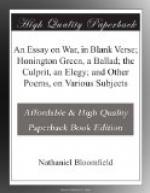Various cares mankind employ;
But to gaze on human woe
Seems the universal joy,
For which they all their cares
forego.
Each from his pursuit departs,
Suffering, dying Man to see;
Surely there are human hearts
That joy in human misery.
Where fictitious tragic woe
Entertains the gaudy ring,
Each the horror can forego,
And instant mental comfort
bring.
When the spirits take alarm,
Prompt to anger, grief, or
spleen,
Reason can dissolve the charm,
And say, ’tis a fictitious
scene.
But to scenes of real woe,
Where a wretch is truely dying,
Wherefore do such numbers go,
What can be the joy of sighing?
Men of thought, who soar serene,
And loftily philosophize,
Will say they seek the solemn scene,
To contemplate and sympathize.
And all the throng will tell you so:
...
’Tis sympathy that brings
them there;
They love to weep for others’ woe,
And come but to enjoy a tear.
If to enjoy the tear that starts,
They run the sorrow’d
scene to see—
Alas! for pity ... human hearts
Delight in human misery.
Still my wretched thought thus strays,
’Midst gloomy scenes
and prospects drear;
My weary mind, in various ways
Seeking Hope, still finds
Despair.
This thought a weight of woe imparts,
At once to sink a wretch like
me;
What can I hope, if human hearts
Delight in human misery?
Tortur’d by severe suspense,
I the Jurors’ Verdict
wait,
Ere I may depart from hence,
Their decision seals my fate.
Now withdrawn, their close debate
Admits no curious, list’ening
ear,
But the result’s so big with fate,
The Culprit must in thought
be there.
And now, led on by sad despair,
Does a frightful form obtrude;
Vindictive Spleen assumes the air
Of noble, manly Fortitude.
And thus I hear the Demon say,
’Let us not abuse our
trust;
’We must not be led away
‘For mercy’s sake,
to be unjust.’
Yet he’ll profess no wrath to feel
’Gainst such a hapless
wretch as I;
No! ... but for the public weal,
’Tis expedient that
I die.
And this his judgment once made known,
Self-love and self-conceit’s
so strong,
He’ll rather let me die than own
That his opinion could be
wrong.
Ye who the lore of distant climes
Canvass, latent truth to find;
Who hail our philosophic times,
And Man’s emancipated
mind:
Oh! ye who boast the enlighten’d
age,
Who boast your right of thinking
free ...
If e’er ye learn the lessons sage,
Taught in affliction’s
school like me,
Should you e’er a Culprit stand,
You’ll wish mankind
all Christians then;
If e’er you raise the Culprit’s
hand,
You’ll wish the Jurors
Christian Men.




